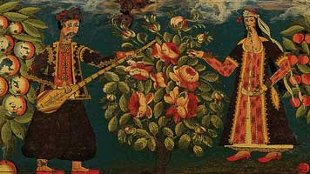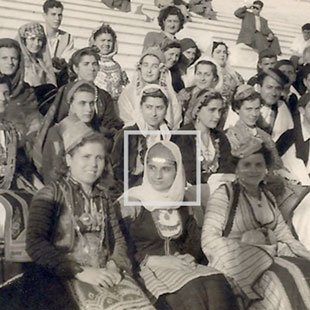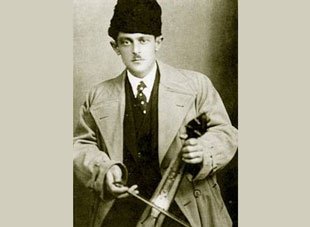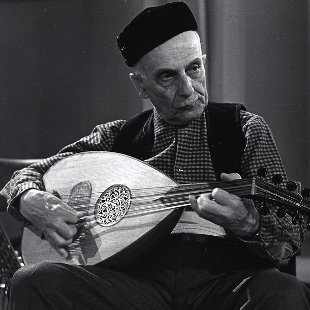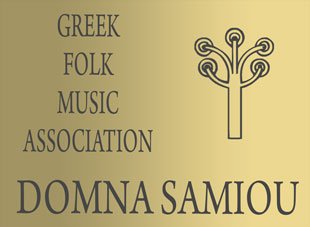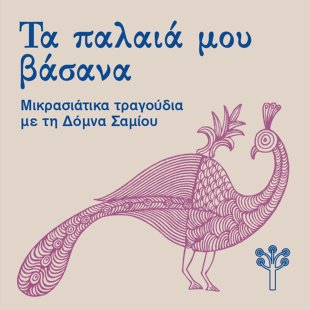You are at: Home page Her Work List of Songs You wear white
Άσπρα φορείς
Listen
Lyrics
You wear white and hold white and white is your dress
And white the flowers that swoon at your passing.
Dance, sweet bride, and I'll sing you a song
I'll sing your praises, sweet angel, all day long.
You say one thing but do another
You' ve taken a vow to make me suffer.
I’ve never seen a bride so fair,
No City* apple tree, no Chios orange grove can compare.
In your white skirt and [your sleeves rolled up]
You stole my wits from me like a witch.
You say one thing but do another
You've taken a vow to make me suffer.
What sky, what sea, what sun, what moon
Gifted our bride with so much grace.
It's you I’m telling, and listen if you want to,
Take pen and paper, sit down and set to.
You say one thing but do another
You've taken a vow to make me suffer.
Translated by Michael Eleftheriou
* City: Constantinople
Original Lyrics
Άσπρα φορείς
Άσπρα φορείς κι άσπρα κρατείς κι άσπρη είν’ η φορεσιά σου
κι άσπρα λουλούδια πέφτουνε απ’ την περπατησιά σου.
Χόρεψε, νυφοπούλα, τραγούδι να σε πω
να σε παινέσω θέλω, κορμί μ’ αγγελικό.
Άλλα λες κι άλλα με κάνεις,
βάλθηκες να με τρελάνεις.
Τέτοια νύφη δεν είδα εγώ ούτε μηλιά στην Πόλη
ούτε νεραντζολεμονιά στης Χιος το περιβόλι1.
Άσπρη μου φουστανούσα και κοτσομάνισσα2,
εσύ το νου μου επήρες, ωσάν τη μάγισσα.
Άλλα λες κι άλλα με κάνεις,
βάλθηκες να με τρελάνεις.
Ποιος ουρανός, ποια θάλασσα, ποιος ήλιος, ποιο φεγγάρι
εστόλισαν τη νύφη μας κι έχει περίσσια χάρη.
Σένα τα λέω, σένα, κι αν θέλεις, άκου τα,
πάρε χαρτί και πένα και κάτσε, γράψε τα.
Άλλα λες κι άλλα με κάνεις,
βάλθηκες να με τρελάνεις.
1 Η Χίος ήταν πασίγνωστη στη Δυτική Μικρασία για τα εσπεριδοειδή της, ιδίως δε στην Προποντίδα και την Κωνσταντινούπολη, όπου δεν ευδοκιμούσαν καθόλου τα ξινά.
2 Κο(υ)τσομάνισσα: με κοντά ή ανασηκωμένα μανίκια (ιδιωματικό του Μαρμαρά).
Information
- Region: Propontis
- Area: Marmara
- Type: Couplets
- Categories: For the Bride, Wedding Song
- Rhythm: 4 beats
- Dance style: Syrtos
- Duration: 03:27
Collaborators
- Singer: Domna Samiou
- Choir: Domna Samiou Greek Folk Music Association Choir
- Clarinet: Thodoris Georgopoulos
- Violin: Nikos Oikonomidis
- Kanun: Panos Dimitrakopoulos
- Constantinopolitan lute: Socrates Sinopoulos
- Saz: Evgenios Voulgaris
- Lute: Kyriakos Tapakis
- Bendir (frame drum): Andreas Pappas
- Tambourine: Vangelis Karipis
- Informant (source of the song): Antonis Marmarinos
Albums
Notes
In the six Greek villages on the island of Marmara, ancient Proconnesus, the wedding songs, which they call nyphikata or nyphilia, are in essence songs of love and passion. Like all the Greek songs of this type, their roots are in ancient Greek songs sung in a similar wedding context (hymenaios, epithalamia, katakoimitika etc.), and their main purpose is to praise the young couple, and to wish them well-being, happiness and a long life together. These songs accompany every wedding custom and ceremony, and have a very positive impact on the mental state of the bride and groom, but also of everyone present, moving them, advising them, praising them, and indicating their new position in society. Intensely poetic, elegant, expressive and making use of symbolic words and allegories aplenty, the popular poet guides the couple along the new path they are embarking upon.
The bridal songs of Maramara, as genuine poetic creations, refer to every moment of the wedding, from the first meeting of the bride and groom through to their betrothal and from there to the end of the wedding feast. The emotions they express are mixed. Joy, happiness and pleasure at beginning a new life, but also sadness, sorrow and melancholy at being separated from parents, especially the bride from her mother.
They have different melodies, depending on their content, which is slow, lyrical and sensual at times, sometimes sad and melancholic, other times frenetic and almost Dionysian, usually played to a four-beat rhythm (syrtos) to be danced to at the wedding feast - as is the case with this song. Almost all the songs consist of couplets which exude beauty and light, lyricism, imagination and exaggerated imagery. In the past, every islander knew countless couplets of this sort by heart, since many had become associated with marriage and were customarily sung at wedding celebrations. Needless to say, the women took the lead here, and this remains true to this day in communities with roots in the Sea of Maramara area (Neos Marmaras, Pyrgadikia, Sarti, Ammouliani, Ouranoupoli, Nea Palatia, Amarynthos, Limni, and elsewhere). Still, those with a talent for it would improvise new couplets relating to the families, talents, beauty, and personalities of the bride and groom.
This song, which is danced to the steps of the local ‘jumping’ version of the syrtos, consists of fifteen-syllable couplets with thirteen-syllable interjected gyrismata, and praises the bride and her unsurpassed beauty. It is followed by an eight-syllable tsakisma which, semantically unrelated to the rest of the song, occurs in various dance songs from Asia Minor. Two similar wedding songs were recorded in Neos Marmaras and included on the records Popular Winter 7 , A1 (1993) and Popular Winter - 10 Years, A2 (1990), compiled and curated by Giorgis Melikis.
Theodor Kondaras (2022)
Recording information
Live recording from the concert Songs of Asia Minor with Domna Samiou at the Megaron, the Athens Concert Hall, on 8/3/2005.
The song was recorded by Domna Samiou in Neos Marmaras, Chalkidiki, in 1983, sung by members of the “Propontis” Cultural Society of Neos Marmaras.
Member Comments
Post a comment
See also
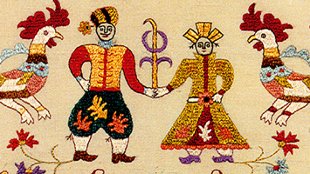

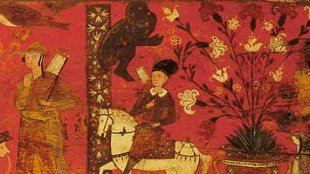
Song
A Little Shorty (Skiathos)

Song
A Prince Is to Be Wed

Song
Dawn Glowed in the East

Song
I Climbed up the Cherry-Tree
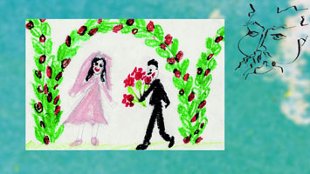
Song
My Royal-Born Pearl Pod

Song
Now Hear Me,…

Song
On Saint George's Eve
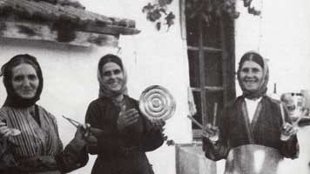
Song
Roumbalia - Carnation

Song
The Boastful Partridge

Song
The Ship Is My House

Song
Well Met
